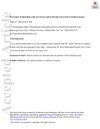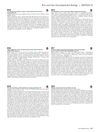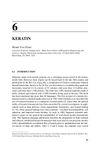 6 citations,
April 1996 in “Journal of histochemistry and cytochemistry/The journal of histochemistry and cytochemistry”
6 citations,
April 1996 in “Journal of histochemistry and cytochemistry/The journal of histochemistry and cytochemistry” TGF-alpha is present in sheep and ferret skin and may affect hair growth without directly stimulating cell proliferation.
 5 citations,
October 2016 in “Experimental Dermatology”
5 citations,
October 2016 in “Experimental Dermatology” Activin A is important for creating new hair follicles.
 5 citations,
November 2011 in “Expert Review of Dermatology”
5 citations,
November 2011 in “Expert Review of Dermatology” The document concludes that early diagnosis and a comprehensive treatment plan are crucial for managing hair loss in children, with a focus on both medical and psychological support.
 4 citations,
August 2018 in “Facial Plastic Surgery Clinics of North America”
4 citations,
August 2018 in “Facial Plastic Surgery Clinics of North America” Platelet-Rich Plasma (PRP), a protein-rich extract from a patient's blood, shows promise in improving hair density, thickness, and quality, but the best method of use and number of treatments needed for noticeable results are still unclear.
 4 citations,
August 2020 in “Applied Materials Today”
4 citations,
August 2020 in “Applied Materials Today” Hydrogel microcapsules help create cells that boost hair growth.
 3 citations,
August 2020 in “Journal of Cosmetic Dermatology”
3 citations,
August 2020 in “Journal of Cosmetic Dermatology” Topical nitroglycerin spray effectively prevents scalp necrosis in hair transplant patients.

Researchers found a genetic link for hereditary hair loss but need more analysis to identify the exact gene.
 November 2023 in “bioRxiv (Cold Spring Harbor Laboratory)”
November 2023 in “bioRxiv (Cold Spring Harbor Laboratory)” Scientists made a mouse that shows how a specific protein in the skin changes and affects hair growth and shape.
 9 citations,
February 2019 in “BMC cancer”
9 citations,
February 2019 in “BMC cancer” M30 is a promising treatment for preventing hair loss during chemotherapy.
 April 2017 in “Journal of Investigative Dermatology”
April 2017 in “Journal of Investigative Dermatology” Removing the Crif1 gene in mouse skin disrupts skin balance and hair growth.
 138 citations,
May 2000 in “Maturitas”
138 citations,
May 2000 in “Maturitas” Estrogen replacement can improve skin health in menopausal women but doesn't reverse sun damage or prevent hair loss.
 119 citations,
January 2014 in “Indian Journal of Dermatology, Venereology and Leprology”
119 citations,
January 2014 in “Indian Journal of Dermatology, Venereology and Leprology” Platelet-rich plasma might help with hair growth and skin conditions, but more research is needed to prove its effectiveness and safety.
 48 citations,
July 2009 in “The Journal of Sexual Medicine”
48 citations,
July 2009 in “The Journal of Sexual Medicine” DHEA did not improve sexual function, well-being, or menopausal symptoms in postmenopausal women with low libido but caused side effects like acne and increased facial hair.
 41 citations,
September 2017 in “Advanced Healthcare Materials”
41 citations,
September 2017 in “Advanced Healthcare Materials” A special hydrogel helps heal skin without scars and regrows hair.
 25 citations,
September 2010 in “Journal of Cutaneous Medicine and Surgery”
25 citations,
September 2010 in “Journal of Cutaneous Medicine and Surgery” The study found that Central Centrifugal Cicatricial Alopecia mainly affects middle-aged African descent women, is linked to certain hair care practices and genetics, and often goes undiagnosed for years.
 20 citations,
February 2017 in “International Journal of Dermatology”
20 citations,
February 2017 in “International Journal of Dermatology” Platelet-based therapies using a patient's own blood show promise for skin and hair regeneration but require more research for confirmation.
 11 citations,
December 2014 in “The American journal of pathology”
11 citations,
December 2014 in “The American journal of pathology” A gene deletion in mice causes weak protein, immune issues, hair loss, airway problems, and wasting disease.
 6 citations,
October 2016
6 citations,
October 2016 Understanding how keratin structures in hair are arranged and interact is key for creating methods to extract and purify them.
 3 citations,
February 2019 in “Animal biotechnology”
3 citations,
February 2019 in “Animal biotechnology” The PLP2 gene affects cashmere fiber quality in goats and is linked to hair growth and loss.
 343 citations,
December 2008 in “Endocrine Reviews”
343 citations,
December 2008 in “Endocrine Reviews” Metformin helps with menstrual cycles and insulin levels in PCOS but is less effective for hair growth, diabetes prevention, and weight loss, and may improve fertility and reduce diabetes risk.
 211 citations,
February 2009 in “European journal of pharmaceutics and biopharmaceutics”
211 citations,
February 2009 in “European journal of pharmaceutics and biopharmaceutics” Hair follicles help absorb and store topical compounds, aiding targeted drug delivery.
 198 citations,
October 2011 in “Journal der Deutschen Dermatologischen Gesellschaft”
198 citations,
October 2011 in “Journal der Deutschen Dermatologischen Gesellschaft” Use minoxidil for hair loss; finasteride and dutasteride for men, dutasteride for women.
 180 citations,
January 2003 in “American Journal of Clinical Dermatology”
180 citations,
January 2003 in “American Journal of Clinical Dermatology” Menopause can lead to skin and hair problems due to hormonal changes, but hormone replacement therapy might help slow these effects.
 100 citations,
April 2010 in “Expert Opinion on Pharmacotherapy”
100 citations,
April 2010 in “Expert Opinion on Pharmacotherapy” Hair loss in men treated best with early medication or transplant, new treatments researched.
 99 citations,
January 2014 in “Nature communications”
99 citations,
January 2014 in “Nature communications” Scientists created stem cells that can grow hair and skin.
 98 citations,
December 2008 in “Journal of Investigative Dermatology”
98 citations,
December 2008 in “Journal of Investigative Dermatology” Prolactin affects hair growth and skin conditions, and could be a target for new skin disease treatments.
 82 citations,
February 2017 in “Cold Spring Harbor Perspectives in Biology”
82 citations,
February 2017 in “Cold Spring Harbor Perspectives in Biology” The TGF-β family helps control how cells change and move, affecting skin, hair, and organ development.
 65 citations,
April 2020 in “International Journal of Molecular Sciences”
65 citations,
April 2020 in “International Journal of Molecular Sciences” PRP injections may be a safe, effective alternative for hair loss treatment compared to minoxidil and finasteride.
 64 citations,
March 2017 in “Journal of Cosmetic Dermatology”
64 citations,
March 2017 in “Journal of Cosmetic Dermatology” PRP treatment may increase hair density and reduce hair loss, but more research is needed.
 60 citations,
April 2012 in “Physiology”
60 citations,
April 2012 in “Physiology” The document concludes that understanding hair and feather regeneration can help develop new regenerative medicine strategies.






























